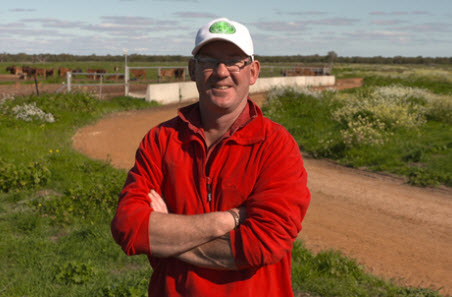Backgrounding underpins MSA grainfed award
27 September 2017
A multi-faceted, custom feedlot catering for producers targeting a range of markets and undertaking assisted breeding programs has received the red meat industry’s top gong for grainfed beef eating quality standards in Western Australia.

Based in the central grainbelt near Dandaragan, Carpenter Beef Pty Ltd runs the 10,400-head capacity Marianna’s Background Facility and 3000-head capacity Johanna Plains feedlot on its 9300 hectare iconic Johanna Plains property, where up to 10,000 head of cattle can also be backgrounded
Both of the company’s feeding facilities are accredited through the Meat Standards Australia (MSA) system and are also a licensed live export depot
The Carpenter Beef enterprise was awarded the 2017 MSA Excellence in Eating Quality Most Outstanding Beef Producer – Grainfed award for Western Australia at Dunsborough last night, for consistently delivering high quality beef to market in compliance with MSA specifications. (Click here for more details about the WA MSA Awards)
From 2015-2017 Carpenter Beef achieved average MSA Index results that placed them in the top 5% of eating quality for grainfed beef nationally. This included achieving MSA compliance rates of 99.96% for fat coverage, where carcases must have a minimum of 3mm rib fat. They also achieved 96.87% compliance to the MSA pH requirements, whereby carcases must have a pH below 5.71.
“These results are particularly significant when the majority of cattle processed through our facilities are of pastoral origin,” Carpenter Beef feedlot manager Nathan Lidgett said.
Mr Lidgett attributes the success of Carpenter Beef’s large-scale beef operation, owned by Rami Koyu’s Central Agri Group, to a dedicated livestock team implementing best practice animal handling techniques, continuity of quality feed sources and regimes, coupled with increasing genetic enhancements being made in pastoral and local cattle.
He said about 80% of cattle fed through the Marianna’s Backgrounding Facility and Joanna Plains Feedlot were sourced from pastoral properties in the Pilbara and Kimberley regions, mostly through long-term supply relationships with northern producers and strong ties with local stock agents.
“Our business needs to be highly adaptable, due to northern and local seasonal conditions, the ever-changing cattle market and the availability and pricing of grain and fodder,” Mr Lidgett said.
The Carpenter Beef feeding operations mainly prepare MSA-graded cattle for direct processing with Harvey Beef or supermarkets in WA, as well as cattle destined for export.
Mr Lidgett said for MSA graded cattle going to the domestic processing sector, weaner heifers and steers entered the feedlot at a target liveweight of about 300kg to 400kg and exit weights ranged from 400kg to 550kg. Most stock were on feed for 72 to 78 days.
Carpenter Beef’s facilities also accumulate cattle for live export into Asia and the Middle East and, as a registered export depot, cattle can be moved straight to the wharf from these facilities.
Mr Lidgett said Carpenter Beef sourced all grain and hay for its feedlots within a radius of about 60 kilometres and, at peak times, could be feeding up to 10,000 head of cattle on any given day. With an overall feed intake of 10-13kg/head/day, that equates to 100-130 tonnes of feed ration per day.
“We have developed strong and loyal relationships with our commodity suppliers, ensuring consistent quality hay and grain procurement,” Mr Lidgett said.
“Our target is to be achieving growth rates above 1.8kg/head/day on the short-fed (72 day) ration program for cattle over 400kg for the Harvey Beef MSA product.
“While undertaking high end (Wagyu/Angus) long-fed (200 day) programs, a slower growth rate closer to 1kg/head/day is required to ensure the establishment of higher quality marbling of the meat.”
Mr Lidgett said Carpenter Beef joined the MSA eating quality program several years ago to cater for clients selling into MSA-accredited processing facilities and markets.
“It has opened-up more options for our pastoralists and farmers to reach the best markets and optimise their returns,” he said.
“Feedback to us through the program has been highly valuable as we continue to make improvements in animal handling, how our yards function and the feedlot exit strategies.
“We can draft cattle in conjunction with MSA guidelines before transporting into specialised ‘trucking pens’ and continue our feeding regime, close to the exit point.
“All of these practices reduce stress on the stock at transport, resulting in minimisation of dark cutting meat and ensuring compliance to the MSA pH requirement.”
Mr Lidgett said many northern WA pastoralists using the feedlots had also been instigating low-stress stock handling systems on their properties in recent years.
He said this was paying-off in better cattle transition to the feedlot and performance in feed conversion during finishing before processing.
“We strive to have cattle handled quietly from the station right through the supply chain and we are seeing better weight gains, ‘happier stock’ and enhanced processing results,” he said.
For more information about the MSA system, visit: www.mla.com.au/msa
To look at your own carcase feedback and use the MSA Index calculator, visit: www.mymsa.com.au


